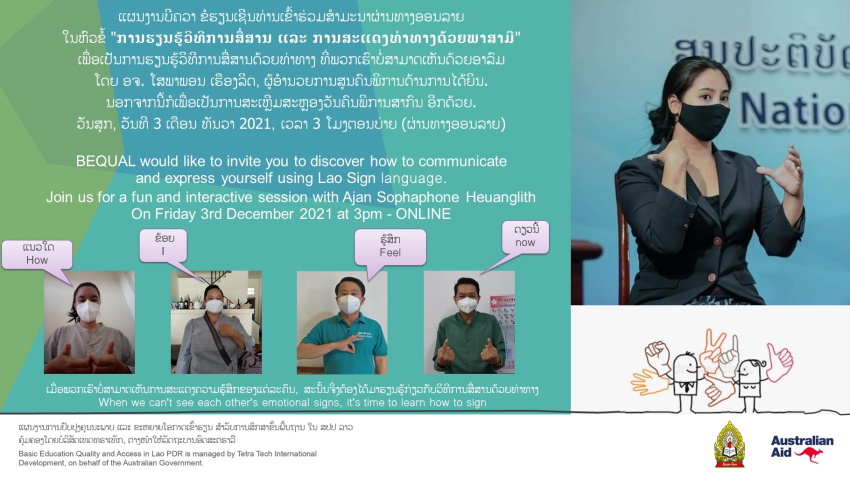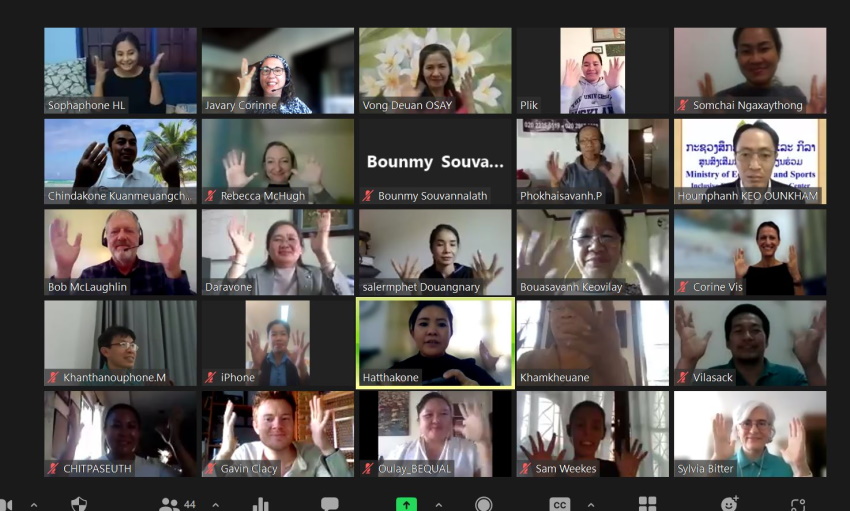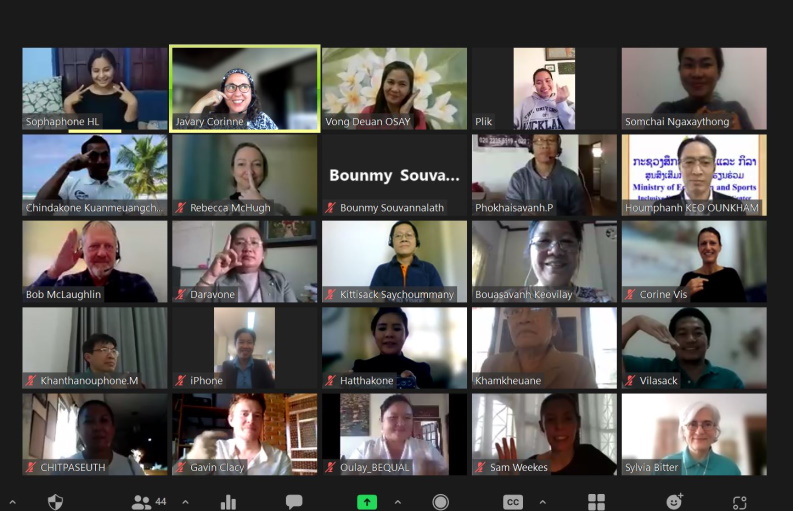In celebration of International Day of people with disabilities, the Australian-funded BEQUAL program organized a fun and interactive session to learn basic Lao Sign Language
The current COVID-19 crisis has made it a real challenge for everyone to know how others are feeling, because our faces are mostly covered by masks. Masks make it difficult to understand what people are saying, even for people with no hearing impairment. For people with a hearing impairment, who often rely on decoding facial expressions and are often skilled at lip reading, interacting with people wearing masks makes understanding how people feel and what they say even more challenging. So, in celebration of the International Day of People with Disabilities the Australian Government through the BEQUAL program launched an initiative to help people of all abilities to communicate as we do our best to connect with each other while wearing masks – a fun lesson in basic Lao Sign Language!
Sign language is a way of communicating used by people who cannot hear well. Sign language implies using mainly hand gestures and movements, and also body language and facial expressions, instead of spoken words.
To commemorate the annual observance of the International Day of Persons with Disabilities on December 3rd, the Australian funded BEQUAL program organized an online fun session to discover how to communicate and express ourselves using Lao Sign Language. Indeed, when we can’t see each other’s well-being behind the face masks, let’s learn how to check on each other with Sign language. “Are you Ok? Do you need help?”.
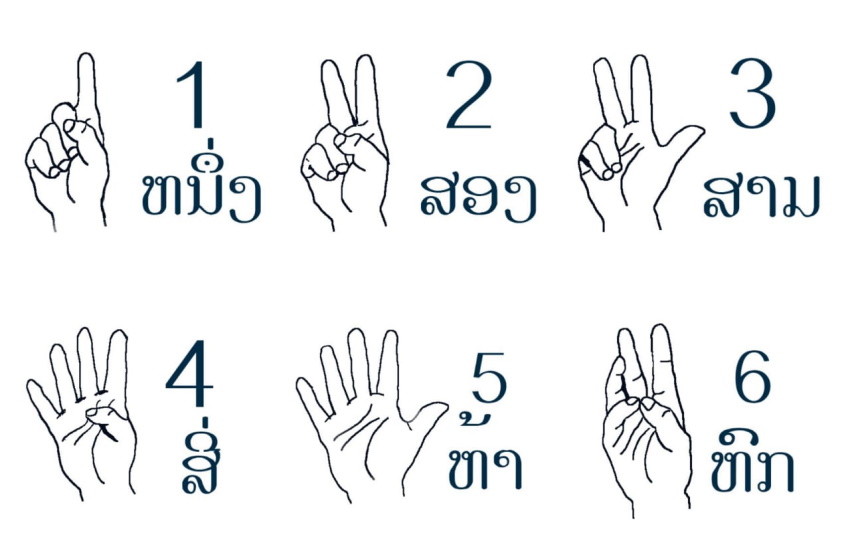
Nearly 50 colleagues from the Ministry of Education and Sports (MoES), the Australian Embassy and the BEQUAL program joined the online session and were introduced to how people communicate who cannot hear. They discovered that Sign language is not universal; people who are poor or hard hearing from different countries speak different Sign languages. Lao has its own Sign language that was first created in 1993 and then revised in 2006.In 2013, the Lao Association for the Deaf was established. There are an estimated 80,000 deaf and hard of hearing people in Lao PDR and less than 10 qualified interpreters in the country. The participants discovered basic Lao signs to communicate and express themselves. They learnt how to introduce themselves, created their personal sign for their name and how to start a conversation. And they could practice their new skills in breakout rooms. For some participants it was also an excellent way to learn Lao language!
Ajan Sophaphone Heuanglith was the teacher of that interactive session. Aj Sophaphone is quite famous these days as the woman who provides Sign language translation for the daily live-streamed COVID-19 updates from the Center for Communication on Education and Health. But even before becoming the interpreter of the Task Force announcements, she had been collaborating with the Ministry of Education and Sports. Following a training organized in January 2021 by the Australian Embassy with support from BEQUAL, the Information and Media Center and E-learning teams from MoES decided to include Sign language dubbing to all the teacher training videos and documentaries produced with the BEQUAL program. The objective was to ensure that people with hearing impairment could have access to these important educational materials.
Inclusive education is a core priority for the Ministry of Education as well as the Australian Government. Under the 9th ESSDP, MoES has committed to decreasing disparities that arise from disadvantage, including disability. Through the BEQUAL program, Australia has been working closely with the MoES to ensure new primary and pre-service curriculum materials are inclusive and represent all Lao people, including children and teachers with disabilities. The new primary curriculum materials increased the focus on inclusive education in all teacher support materials including teacher guides, teacher support packs, teacher training videos and teacher orientation workshops. The new national primary curriculum is being taught in specialist schools for children who are deaf or have hearing impairment via skilled teachers who teach in Lao Sign language. The revised pre-service curriculum taught in the Teacher Training Colleges to future primary school teachers now includes a module on Inclusive Education that covers key inclusion topics and issues and better equips teachers to understand disability, social and gender inclusion. Australia, through the BEQUAL program has also supported the Ministry with the development process of School Construction Guidelines that contain guidance on disability inclusive design and gender equity.
On the International Day of Persons with Disabilities, let’s continue to advocate for more inclusion!
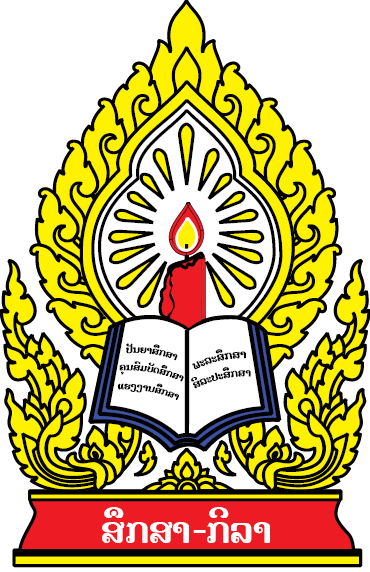
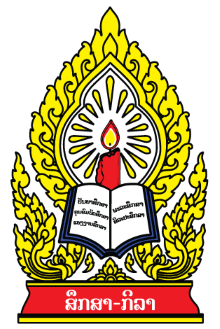


 ພາສາລາວ
ພາສາລາວ
